Contents

Awesome Games and Activities for Kids with Numeracy Difficulties How to Feel Smart and In Control about Doing Mathematics with a Neurodiverse Brain Judy Hornigold Illustrated by Joe Salerno

Contents
An Introduction for Parents
(and Interested Children)
Why I Wrote this Book
Have you ever felt anxious about maths? Or maybe you feel that you cant do maths and are worried about what people will think about you if you get the answer wrong. Lots of people feel like this sometimes, and that is why I decided to write this book. When I was at school, I felt this way and I didnt enjoy maths at all. I didnt really understand it and it made me feel bad when I couldnt do it. But then something wonderful happened. A new teacher arrived at the school called Mrs Robin, and she loved maths.
She loved it so much that soon I grew to love it too. I began playing with numbers and discovered the amazing patterns that they can make. I stopped being frightened of making mistakes and started enjoying exploring numbers. This love of maths has lasted my whole life and I am still finding out new things about numbers almost every day. This book is a collection of some of the most awesome activities and curiosities in maths that I have enjoyed over the years. You dont need to be good at maths to do them, but you will need a calculator for some of them.
You will also need a selection of family members and friends to amaze and astound with your incredible new maths knowledge. I have split the book into nine chapters as I describe below, so amongst other things you can choose whether you want to be creative, play a game, impress your friends or simply be amused. The choice is yours. I hope that you enjoy this book and that it will spark a love and fascination for maths.
How to Use this Book
This book is for you, to help you feel smarter when you do mathematics, and to empower you to realise all the fun you can have with numbers, so they dont feel scary any more. I have organised the games and activities into nine chapters.
You dont need to work through the chapters in order. You can pick and choose and just do what looks most intriguing or fun, or challenging (in a good way!) to you first. You can dip in and out of any chapter at any time. Some of the games require the use of a calculator, but if you want a challenge, you can always play without a calculator. If you are going to use a calculator, see if you can have a good guess at what the answer may be before you plug in the numbers. (Play Some More!) are a collection of games using playing cards and dice, focusing mainly on the four operations. (Play Some More!) are a collection of games using playing cards and dice, focusing mainly on the four operations.
Games with playing cards are a great way of exploring numbers and finding out how numbers combine. They are also something you and your friends or your whole family can enjoy together. Ponder It! () introduces you to some of the mysterious numbers and patterns in the weird and wonderful world of maths. It is guaranteed to spark your curiosity and intrigue. Pattern spotting is a key skill in maths, and this chapter will encourage you to seek out patterns in numbers. You can channel your inner magician in , Conjure It! The tricks in this chapter are a great way to build confidence in mathematics at the same time as impressing friends and family.
If you feel that you are anxious about working with numbers, this is the chapter for you as it will make you feel that you are the most amazing mathematician on the planet! Simplify It! provides you with some shortcuts in numeracy; for example, how to tell what a number can be divided by and how to multiply by certain numbers. The tips in this chapter give you great ways to boost your confidence when multiplying and dividing. Returning to the world of magic, but this time by looking at fascinating magic squares, Square It! is one of my personal favourites! They may seem almost impossible to construct but in this chapter I show you how to make your own magic squares. Another way to impress friends and family! , which Ive called Make It! reminds us that maths is not all about number crunching. Many people find the spatial side of maths much easier to understand than the number side. The creativity in this area of mathematics is very satisfying to explore.
You can explore tessellation and the work of Escher as well as making your own tessellating shape. (Riddle It!) is just for fun. Its a collection of jokes (some funnier than others) and a collection of riddles and mathematical picture puns. Maybe you can come up with some even better ones! Believe It! is where we look into some almost unbelievable maths facts strange but true. You may be inspired to try to find out some more for yourself.
An Introduction for Parents (and Interested Children)
Young children are naturally curious and endlessly playful.
An Introduction for Parents (and Interested Children)
Young children are naturally curious and endlessly playful.
They have no fear of numbers and are intrigued by them. If you observe children in nursery or reception exploring numbers, you will find that they are often quite mischievous and experimental. They havent learnt the rules associated with adding, subtracting, multiplying and dividing and are not bound by what they think the teacher wants them to do. They are not focused on getting the correct answer, nor doing the sum quickly and in their heads. They are simply having fun. Sometimes they deliberately make a mistake to see how adults will react.
For example, when asked to stand on the number 9 on a mat showing the numbers 1100 one child stood on the number 23 and looked up with a cheeky grin. It wasnt that he thought 23 was the number 9, it was that he wanted to play a trick on the teacher to see what they would say. There was a glint in the eye joviality in his play with numbers. Young children often come up with sums like this: 1 + 0 + 0 + 0 + 0 + 0 + 0 + 0 + 0 + 0 + 0 + 0 + 0 + 0 + 0 + 0 + 0 + 0 + 0 + 0 + 0 + 0 + 0 + 0 + 0 + 0 + 0 + 0 + 0 + 0 + 0 + 0 + 0 + 0 + 0 + 0 + 0 + + 0 + 0 + 0 + 0 + 0 + 0 + 0 + 0 + 0 + 0 + 0 + 0 + 0 + 0 + 0 + 0 + 0 + 0 + 0 + 0 + + 0 + 0 + 0 + 0 + 0 + 0 + 0 + 0 + 0 + 0 + 0 + 0 + 0 + 0 + 0 + 0 + 0 + 0 + 0 + 0 + + 0 + 0 + 0 + 0 = 1 which they think is hilarious. What an incredibly large sum they have done! But actually, they have grasped an important concept about the effect of adding zero. They enjoy making patterns like this: 1 x 1 = 1 1 x 1 x 2 = 2 1 x 1 x 1 x 3 = 3 1 x 1 x 1 x 1 x 4 = 4 1 x 1 x 1 x 1 x 1 x 5 = 5 etc.
These, and the different games and activities you will read about in this book, are fun things for children to do. But they also show that children can have a deep understanding of some important concepts in maths, such as the effect of multiplying a number by 1 or the effect of adding 0 to a number, even before we see them carrying out more obvious maths problems with confidence. It is through exploration and play that young children can develop a deep, rich and long-lasting understanding of these concepts. But as children go through school, they begin to learn that there are certain expectations and rules. They learn that it is good if you get the answer right and bad if you get it wrong. Children can then become anxious about making mistakes and there is a fear of appearing stupid in front of their peers.
So, for some children, unfortunately, the amusement and enjoyment of maths is replaced by anxiety and confusion. Maths becomes something to be avoided. But avoiding it is not an option. Just think about all the maths that we do, incidentally, every day. Lets look at a typical day in a childs life and see just how much real maths a child is actually doing. Adults, you can share this box with your child or other young children so they can see how maths is part of so much of what we do.

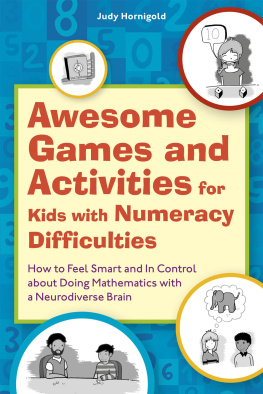
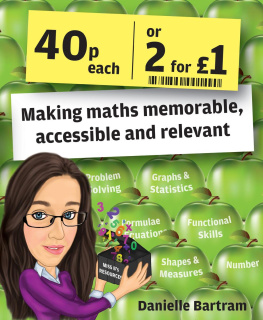

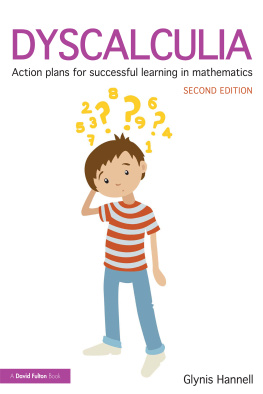
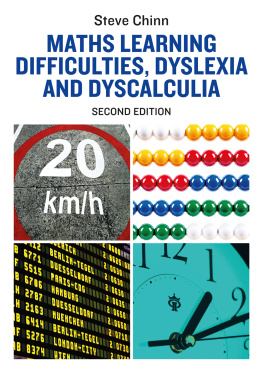
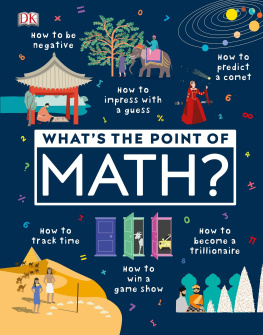
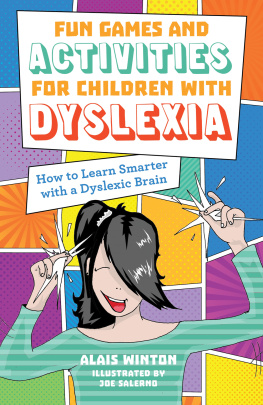
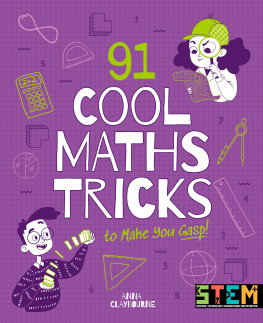
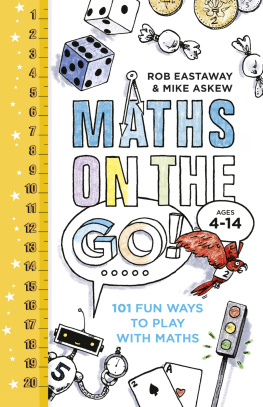
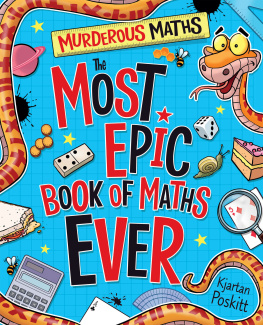

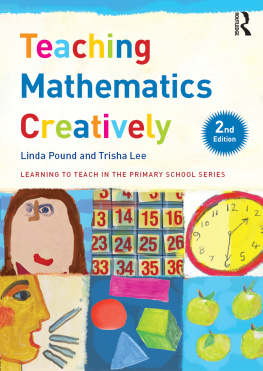

 Awesome Games and Activities for Kids with Numeracy Difficulties How to Feel Smart and In Control about Doing Mathematics with a Neurodiverse Brain Judy Hornigold Illustrated by Joe Salerno
Awesome Games and Activities for Kids with Numeracy Difficulties How to Feel Smart and In Control about Doing Mathematics with a Neurodiverse Brain Judy Hornigold Illustrated by Joe Salerno 